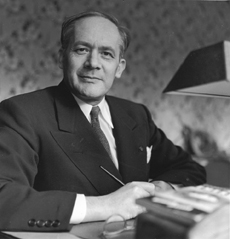Just weeks before Watchers Of the Sky opened in theaters, the United Nations put on trial for genocide the most senior surviving leaders of Cambodia’s Khmer Rouge and also accused ISIS for intending to commit genocide against the Yazidis in Iraq. This moving and thoughtful documentary moves beyond outrage at singular atrocities to trace the decades of effort it took for the world to agree on a name for man’s large-scale inhumanity to man, then to structure that condemnation into functioning international law, thanks to one obsessed man.
Before the Holocaust, Raphael Lemkin coined the term genocide after years of historical and multilingual research into millennia of wholesale murder. He then developed the institutional framework for the International Criminal Court. His biography is told through his own words, in readings from his memoirs, and clips of rare interviews, illustrated by simple, but magical animation in shades of blue and black.
A witness to the pogroms and displacements circa World War I in his native Poland, Lemkin was horrified by the lack of attention to Turkey’s subsequent massacre of Armenians. As explained by Samantha Power, now United States Ambassador to the United Nations, he questioned: “Why is the killing of a million a lesser crime than a killing of an individual?” And many images of awful, historical killings stream on screen. In 1933, Lemkin submitted a paper to an international law conference proposing the world organize against “barbarity.” Yet like a Jewish Cassandra, he could not convince his family to leave their hometown in time. He fled Warsaw as it was falling to the Nazis to land as an impoverished, and anguished, refugee in the United States in 1941.
The film emphasizes that Lemkin was disappointed in the trials at Nuremberg because none of the indictments specified genocide against the Jews and the Roma. Nonagenarian Ben Ferencz proudly describes his work—his first case as a young lawyer—successfully prosecuting 22 defendants in the Nazis’ exterminating Einsatzgrauppen brigade in Eastern Europe. Lemkin was convinced that the Holocaust, while large-scale and technologically efficient, was not an anomaly, and he seized on the new United Nations as the instrument for the world to finally prevent it from repeating through a Genocide Convention. Guilt ridden to the point of obsession, Lemkin keeps drafting, redrafting, and rewording the formal document until the General Assembly passed it in 1948, to take effect in 1951, and he relentlessly lobbied nations for its ratification until he died in 1959 (146 countries have so far). Journalists and activists recall his driven monomania.
Director Edet Belzberg intersperses the biographical tribute with stories of dedicated advocates who are realistically grappling with implementing Lemkin’ idealistic vision through international mechanisms, including the International Criminal Court that Ferencz dedicated himself to seeing established. The individuals are interviewed as case studies and cred Lemkin’s prescience in demonstrating the difficulties in first identifying genocide, then in trying to stop it, and meting out punishment. (The first Chief Prosecutor Luis Moreno Ocampo has already been seen dealing with the ethnic and religious catastrophe in Darfur Now and The Devil Came On Horseback, both from2007). This film ponders the ramifications more deeply than in Pamela Yates’s congratulatory The Reckoning: The Battle for the International Criminal Court (2009), and the court has been functioning in partnership with the Cambodian government, as in Thet Sambath and Rob Lemkin’s Enemies of the People (2010) and Annie Goldson and Peter Gilbert’s Brother Number One. As much an optimist as Lemkin, Power tracks how the court gears up against violators in Sudan.
Lemkin’s haunted personal history seems to be relived in how Rwandan genocide survivor Emmanuel Uwurukundo, UN Refugee Agency Field Director in Chad, deals with running three growing refugee camps, and through the testimonies from survivors of other horrors. Looking beyond Lemkin’s approach, Uwurukundo mulls the non-Western extrajudicial tactics that are being used in Rwanda, as in Anne Agnion’s My Neighbor, My Killer (2009), or in Sierra Leone in Rebecca Richman Cohen’s War Don Don (2010). They prove Lemkin’s recognition that the best we can do is to expect the worst of human beings, yet rise above it.







Leave A Comment